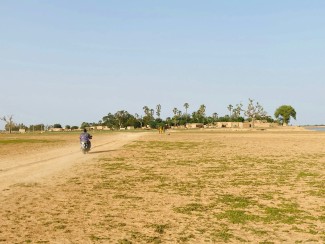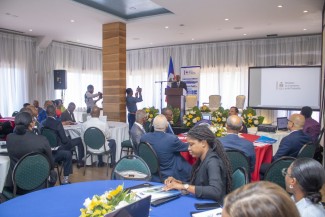The COVID-19 pandemic has impacted trade in the world’s least developed countries (LDCs) in a myriad of ways – from the complete collapse of tourism in some LDCs, to the rise of e-commerce opportunities in others. It’s also expected to impact donor country aid budgets for many years to come.
As members and partners of the World Trade Organization (WTO) meet this week to assess these trade impacts and chart a way forward, the Enhanced Integrated Framework (EIF) has been buried deep in thousands of pages of reports, charts and data to find pearls of wisdom that can help LDCs find innovative ways to continue financing trade.
Launching today, these Trade Funding Insights clearly and concisely outline how COVID-19 is currently projected to impact official development assistance (ODA) and Aid for Trade, as well as case studies and concrete steps that LDC Ministries of Trade, government donors, Investment Promotion Agencies and the private sector can take to harness opportunities offered by impact investment, blended finance and foreign direct investment.
Some of the most interesting findings include:
1. Valued at US$715 billion, the impact investment market is nearly five times larger than government aid from the OECD Development Assistance Committee.
2. 63% of the world’s leading impact investors surveyed in 2020 said that COVID-19 is ‘unlikely’ to change their impact investment objectives over the next five years.
3. The Ethiopian Investment Commission has been leading the way in rapid responses to investor challenges in LDCs – communicating with investors via Twitter, helping investors repurpose production lines and expand e.g. manufacturing hand sanitizers, establishing a ministerial-level to provide centralized and coordinated leadership, and making approval and licensing processes more flexible.
4. Blended finance is a strategic way to use public and philanthropic funds to increase private investment in sustainable development – the International Finance Corporation has found that every US$1 of concessional finance leverages US$4 of additional finance in LDCs (from Development Finance Institutions, the sponsor and/or other financiers).
Click on the titles below to download copies of these Insight briefs.
We are grateful to the many experts from partner organizations who gave their time and knowledge to provide input and review these briefs. Thank you to Jean-Philippe de Schrevel, Marie Puaux, Katherine Milligan, Asok Arun and Ximena Escobar de Nogales from Bamboo Capital Partners; Christian Regnicoli from responsAbility Investments AG; Frans Lammersen, Yasmin Ahmad, Aussama Bejraoui, Valentina Bellesi and Paul Horrocks from the Organisation for Economic Cooperation and Development (OECD); Ivan Nimac from the World Bank Group (WBG) together with Kruskaia Sierra-Escalante, Luigi Lannutti and Rebecca Post from the International Finance Corporation (IFC), WBG.
We’d love to hear what you think of the briefs, or any ideas you have about helping connecting LDCs with innovative financing opportunities. Contact us at EIFpartnerships@wto.org.
If you would like to reuse any material published here, please let us know by sending an email to EIF Communications: eifcommunications@wto.org.



